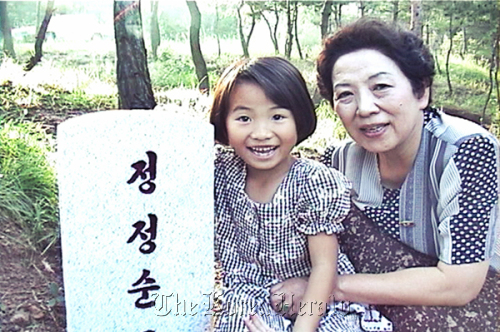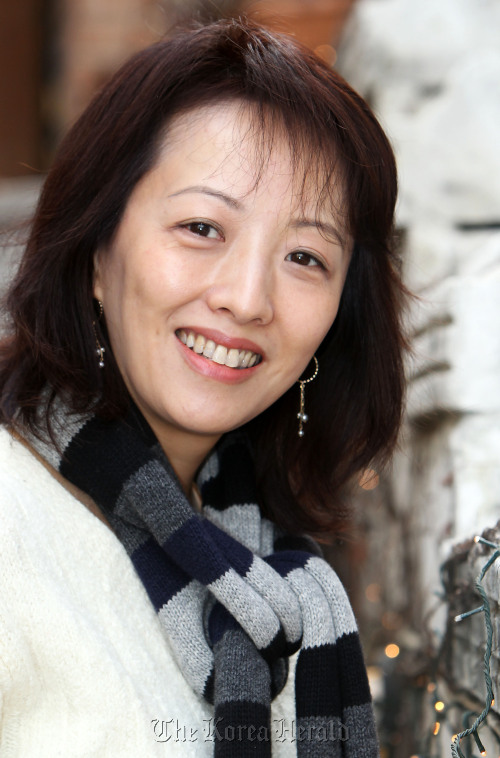Personal documentary recounts tale of Korean-Japanese who resettled in N. Korea
Movie director Yang Yong-hi has a one-of-a-kind family.
She lives in Tokyo, her mother in Osaka and her brothers in Pyongyang, North Korea.
Born in Japan to pro-Pyongyang ethnic Korean parents, Yang tells about her life and family history in a cinematic form.
But the 47-year-old director’s second personal documentary “Goodbye Pyeongyang,” also inevitably reveals complex and painful history of ethnic Koreans living in Japan, far beyond the story of Yang’s own “zainichi” ― long-term Korean residents in Japan ― family. “I’d been rather burdened and overwhelmed by my own family history,” Yang told The Korea Herald on Friday.

Yang’s niece, Son-hwa (left), poses with her grandmother (Yang’s mother) at her mother’s grave in North Korea in the 1990s. (Kinoeye DMC)
“It was when I reached my 30s that I looked at my family from a different perspective. For the first time, I thought it was quite interesting.”
Originally from South Korea’s Jeju Island, Yang’s parents suffered from financial destitution in the 1960s in Japan.
It was the North Korean government that offered to support the impoverished ethnic Koreans in Japan at the time, while South Korea mostly remained hesitant.
“My father had been extremely poor in Jeju even before he moved to Japan,” Yang said.
“He barely finished high school and did not know much about political ideologies. He was just extremely thankful to Kim Il-sung, who helped him when he was, in his words, ‘living like a piece of garbage.’ That’s how he formed such strong loyalty towards the North Korean regime.”

Documentary “Goodbye Pyeongyang” director Yang Yong-hi. (Yonhap News)
Yang’s father ― who died of a stroke in 2009 ― soon joined “Chongryon,” the General Association of Korean Residents in Japan, an organization that functions as North Korea’s de facto embassy in the country. In the 1970s, he decided to send his three sons ― who were in their late teens ― to Pyongyang in support of the zainichi Koreans’ repatriation program.
“He thought the two Koreas would be unified in the next 10 years or so and would be able to live with my brothers again,” Yang said.
“What’s ironic is that he’d always wanted to go back Jeju Island, not Pyongyang, if Korea were unified.”
Yang was six years old when her brothers were sent away.
“It was a traumatic experience,” Yang said. “There were celebrations and many other forms of propaganda. I just had this feeling that they are going somewhere far, and they would not return.”
Ever since her brothers left for North Korea, Yang’s mother has been sending money and parcels of living supplies to Pyongyang. The brothers have been heavily relying on their parents’ support from Japan.
Yang’s eldest brother, who had dreamt of becoming a musician before leaving for Pyongyang, suffered from depression for 30 years and died of a sudden heart attack in 2009.
Yang made her first documentary, “Dear Pyeongyang” based on her 13 years of experience visiting her brothers in the communist country from time to time.
The 2006 movie won awards at the Berlin International Film Festival and the Sundance Film Festival.
The newly-released “Goodbye Pyeongyang” tells the story of Yang’s niece Son-hwa, who was born and raised in North Korea’s capital.
“When I first saw Son-hwa’s photo,” Yang said, “I thought I was looking at another version of myself.”
Starting in 1995, Yang brought her video camcorder whenever she visited her niece in Pyongyang. In the movie, Son-wha grows up from a bubbly 3-year-old to a shy, reflective teenager. She would recite poems that praise Kim Jong-il, talk about the boy she likes in her class, and simply hang with her aunt Yang.
Yet Son-hwa is not an ordinary North Korean schoolgirl. As an elementary student she would wear a pair of Mickey Mouse tights, which her grandparents in Japan bought her. Though not obvious, it’s easy to sense that Son-hwa lives a relatively comfortable life compared to her classmates in school.
”People in North Korea would always say, ‘Thank you, our leader, we are happy because of you,’” Yang said. “But my nephews and nieces would very often say, ‘Thank you, grandpa and grandma.’ That’s the hidden truth (in the film) ― that these kids are raised and supported by their grandparents who live overseas, (not by Kim Jong-il).”
Toward the end of the movie, Yang shows a letter from Son-hwa, who has just been accepted to a university. The camera thoroughly studies the letter ― which is written in fluent English ― overlaid with the most recent photos of Son-wha, who has grown into a young woman.
Just like Son-hwa in the film, Yang was taught to praise North Korean leaders and strictly believe in communist values while attending Chongryon schools in Osaka.
“But I was only North Korean when I was in school. Once I got out school I went to see concerts and movies, enjoying the other side of the world,” Yang said. “But Son-hwa does not have that option.”
Yang said she was extremely angry when her teachers told her she should only work for Chongryon, nowhere else, after she finishes school.
“My family would’ve been an ideal Chongryon family if I behaved the way my teachers wanted me to,” Yang said. “There was a lot of pressure to have certain values and ideologies as a North Korean. But I wanted to make my own decisions for my life.”
Yang, who described North Korea as an “extremely hierarchical, Kim Jong-il-oriented capitalist society,” obtained her South Korean citizenship in 2003. “I didn’t want to, and still don’t really want to be a South Korean,” Yang said. “I just needed a passport that would allow me to visit whichever country I want.”
Before applying for her South Korean citizenship, Yang used a special certificate issued by the Japanese government whenever she needed to go overseas.
Yang has been banned from entering North Korea since the release of her first film, and Chongryon in Osaka asked her to write a formal letter of apology, which she refused. Yang’s mother still visits Pyongyang.
While showing a layered and nuanced cinematic piece, Yang said there is no specific message in the film that she wants to deliver.
“My brothers do not really speak in front of the camera throughout the movie.” Yang said. “But their safety is still at risk by appearing in this film. What I show is the outward appearance of a Pyeongyang family. It’s up to the viewers to interpret what’s behind it.”
“Goodbye Pyeongyang” opens in theaters on Mar. 3.
By Claire Lee (clairelee@heraldcorp.com)







